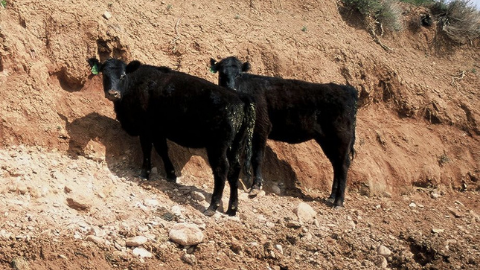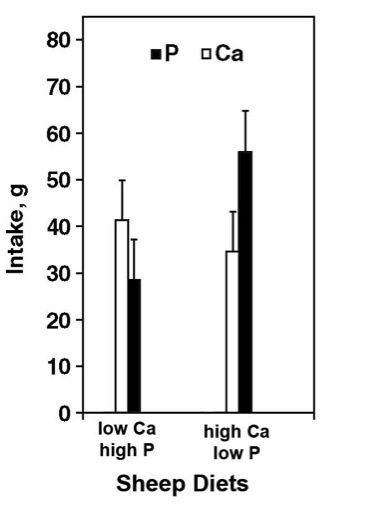Can Ruminants Rectify Mineral Deficiencies?
Calcium and Phosphorus

Two heifers eating clay from hillsideMany animal nutritionists will tell you ruminants are incapable of eating minerals in correct amounts to prevent or correct mineral deficiencies and a number of older studies support this claim. However, a better understanding of diet selection is leading to better experiments to determine if animals can learn to rectify mineral deficiencies. One important change in these studies is allowing animals the opportunity to pair the flavor of a mineral with recovery from a deficit of that mineral.
So, if you’ve noticed your animals eating soil, bones, feces or other unusual items, they may have a mineral imbalance. Can animals detect mineral deficiencies? Recent research says yes.
Several studies conducted by Research Assistant Professor Juan Villalba, looked at calcium and phosphorus deficiencies in lambs. In the first study, lambs avoided phosphorus (P) when P was fed in excess, and increased their preference for P during periods of P deficiency. In another study, sheep on a P-deficient diet increased intake of a P supplement when given a choice between a P or calcium (Ca) supplement. Conversely, sheep eating a Ca-deficient diet ate more of a Ca supplement than sheep fed a diet high in Ca (Figure below).
 During the trial, Juan observed something we’d never seen, lambs licked and chewed the dirt not only in their own pens but also in their neighbors’ pens. Lambs were observed eating soil, feces and licking urine of their neighbors. Lambs in the study were randomly assigned to pens, so lambs on a high P and low Ca diets were often penned next to lambs on a low P and high Ca. They were apparently alleviating their mineral deficiency by licking urine and eating feces from their neighbors. Blood mineral levels remained normal even though lambs were fed deficient diets. When animals were separated, blood mineral levels dropped. Evidently, lambs were able to solve their mineral deficit as long as they had a source of minerals even if their solution was pretty disgusting.
During the trial, Juan observed something we’d never seen, lambs licked and chewed the dirt not only in their own pens but also in their neighbors’ pens. Lambs were observed eating soil, feces and licking urine of their neighbors. Lambs in the study were randomly assigned to pens, so lambs on a high P and low Ca diets were often penned next to lambs on a low P and high Ca. They were apparently alleviating their mineral deficiency by licking urine and eating feces from their neighbors. Blood mineral levels remained normal even though lambs were fed deficient diets. When animals were separated, blood mineral levels dropped. Evidently, lambs were able to solve their mineral deficit as long as they had a source of minerals even if their solution was pretty disgusting.
Mineral nutrition is extremely complex. The amount of a particular mineral an animal will eat depends not only on the level of that mineral in the body but also on its interactions with other minerals. The body’s feedback mechanisms likely enable animals to make correct choices and maintain their mineral status. The study above indicates animals correct for Ca and P deficiencies.
References
- Villalba, J. J., F. D. Provenza, J. O. Hall, and C. Peterson. 2006. Phosphorous appetite in sheep: Dissociating taste from post ingestive effects. J. Anim. Sci. 84:2213–2223.
- Villalba, J.J., F.D. Provenza, and J.O. Hall. 2008. Learned appetites for calcium, phosphorus, and sodium in sheep. J Anim Sci. 86:738-747.
If you'd like more information on this topic read the fact sheet: Mineral Nutrition: Are Animals Nutritionally Wise?

